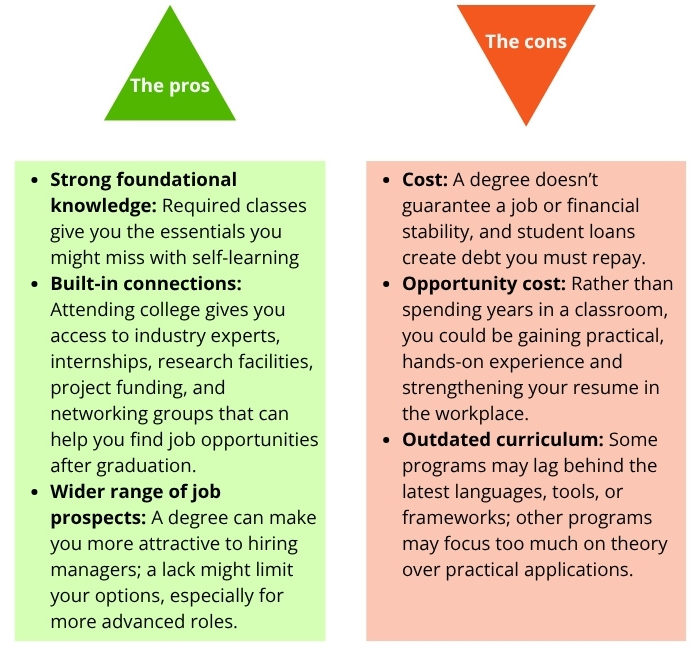
Tech Without a Traditional Degree
Posted by
What do tech titans like Bill Gates, Steve Jobs, and the founders of Spotify and Twitter all have in common? For one thing, they’ve all managed to build successful careers — and companies — without a college degree. If the idea of joining the list of successful tech innovators who dropped out of (or never attended) college sounds appealing, remember to be realistic. Reaching their level of success isn’t the norm, and skipping college isn’t a shortcut to a successful career. However, their stories remind us that college isn’t for everyone, and that plenty of other pathways toward building a career in tech exist. (Check out our Pathways After High School for inspiration!)
From bootcamps and certification programs to free online courses, many resources can boost your credentials. If you’re thinking about a future in tech, here are three steps to start your career on the right track.
Weigh the benefits (and drawbacks) of attending college
Before making a big decision about your future — like whether or not to go to college — make a list of pros and cons. It might look something like this:

As you build your own list, consider your future career goals, learning style, flexibility, and financial situation. Investigate different types of colleges, including online degree programs and your local community college. An online associate program’s structured format can benefit students who struggle with self-directed learning; community colleges offer a great option for those who prefer in-person instruction. But if college in any form feels “off” for you, it’s time to start exploring other options!
Alternative learning paths: Bootcamps, certs, and online courses
The beauty of non-degree programs is their flexibility and affordability. Plus, they’re varied enough that you’ll likely find one that fits your needs. Here are seven types of non-degree programs:
- Bootcamps: Intensive, short-term programs that teach key skills in a specific area (coding, UX design, data science, etc.) so you can quickly move from a beginner-level to a higher level of competency.
- Certificate programs: Structured programs from companies or universities that award a certificate upon completion, demonstrating expertise in specific, job-ready skills. They typically take a few months to a year to complete.
- MOOCs (Massive Open Online Courses): Free, online courses created by companies, universities, and learning platforms and designed for anyone to access, anywhere in the world.
- Professional certifications: Industry-recognized credentials earned by passing an exam. They include foundational skills and fundamentals, and more advanced, associate-level specializations in areas like cloud computing, security, or networking.
- Microcredentials: Compact, skill-specific programs designed to elevate your expertise in a niche area. “Stack” them with other programs or certificates to develop a more comprehensive skill set.
- Workshops: Short, hands-on sessions covering specific tools, frameworks, or topics. They’re typically held over a few hours or days, often with opportunities for discussion and networking.
- Online Courses: On-demand courses with video lectures, readings, assignments, and varying degrees of step-by-step guidance and support. Most are asynchronous, so you can complete them at your own pace around your schedule.
While workshops and professional certifications often have a fee, many free and low-cost online learning opportunities covering coding, cybersecurity, IT, programming, data analytics, cloud infrastructure, and more exist. Check out these online learning platforms and resources to start:
Coursera
Coursera is a subscription-based online learning platform. It also offers free courses to begin exploring new topics, skills, and fundamentals. Interested in a particular paid course? Apply for Coursera financial aid and enroll at a discount. Sample courses in computer science, data science, and information technology include:
- Python for Data Science, AI & Development, IBM (Beginner, 1-3 months)
- Meta Front-End Developer, Meta (Beginner, 3-6 months)
- Learn to Program: The Fundamentals, University of Toronto (Beginner, 1-3 months)
- Introduction to Networking, NVIDIA (Beginner, 1-4 weeks)
- System Administration and IT Infrastructure Services, Google, (Beginner, 1-3 months)
freeCodeCamp
Want to join a community of coders and access free tools to enhance your learning? Try freeCodeCamp. This nonprofit offers free courses and certifications in data visualization, back-end development, information security, and machine learning (you name it!). The platform has other free online courses and bootcamps, helpful resources for the job search (including interview prep), and forums to share your questions and connect with fellow programmers.
Harvard online courses
One of Harvard’s most well-known online tech courses is CS50: Introduction to Computer Science, an 11-week course covering computer science basics. This introductory course might be challenging for new programmers, so consider dipping your toes into some shorter, beginner-friendly courses before trying this one. Once you’ve mastered the fundamentals, you explore more specialized topics in Scratch, Python, cybersecurity, and artificial intelligence.
YouTube
YouTube can feel like a bottomless pit of random videos, but it’s actually a great tool for learning new things in an easy, relatable way. If you’re just beginning your tech exploration, try a few YouTube rabbit holes and look for a creator who explains things in a way that clicks for you. When you’re ready to get a certification, check out these channels:
Professor Messer
The CompTIA A+ certification is an essential qualification in the IT world. It’s a challenging test, covering hardware, networks, and computer systems, and it costs $265. But you know what’s free? Professor Messer’s videos and lectures. These courses will familiarize you with the test content, and if you want additional resources, you can buy digital notes, practice tests, and more on his website.
Network Chuck
The Cisco CCNA certification covers networks, IP, security fundamentals, and more, for $300 per test. Studying for your CCNA certification? Check out Network Chuck’s free CCNA course, a playlist of 24 videos, from “What is a router?” to “What is an IP address?” to familiarize you with the CCNA exam material.
Pro tip
One thing an online course or bootcamp can’t teach you? How to learn. Be honest with yourself about the structure, resources, and environment you need to stay committed and learn effectively.
Develop your most valuable skill: Intellectual curiosity
While some people may call curiosity an intrinsic character trait, I’d argue that it’s a skill — one you can practice, grow, and apply to every area of your life. When building a career in tech, it’s one of the most valuable skills in your toolbox.
Technology constantly evolves, and it takes commitment to keep pace. Of course, gaining the required hard skills and technical knowledge is paramount to landing your first tech role. Regardless of your path, embracing lifelong learning helps you adapt, stay motivated, and be ready for whatever challenges and opportunities come your way.
Blog Categories
- Career Advice
- College Admissions
- Colleges & Universities
- Financial Aid and Scholarships
- For Counselors
- For Parents
- For Students
- Gap Years
- Mental Health and Wellness
- Online Learning
- Performing and Visual Arts
- STEM Majors and More
- Summer Programs
- Teen Volunteering
- Trade & Vocational Schools
- Tutoring & Test Prep

Organization with listings on TeenLife? Login here
Register for Free
We’re here to help you find your best-fit teen-centered academic and enrichment opportunities.
Forgot Password
"*" indicates required fields








